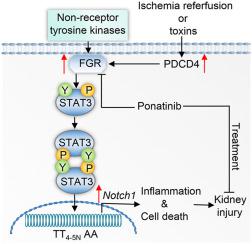Acta Pharmaceutica Sinica B ( IF 14.7 ) Pub Date : 2020-11-05 , DOI: 10.1016/j.apsb.2020.10.024 Xu Jing , Dandan Ren , Fei Gao , Ye Chen , Xiao Wu , Yue Han , Qingsheng Han , Liang Li , Xiaojie Wang , Wei Tang , Yan Zhang

|
Recent studies have shown that programmed cell death 4 (PDCD4) modulates distinct signal transduction pathways in different pathological conditions. Despite acute and chronic immune responses elicited by ischemia contributing to the functional deterioration of the kidney, the contributions and mechanisms of PDCD4 in acute kidney injury (AKI) have remained unclear. Using two murine AKI models including renal ischemia/reperfusion injury (IRI) and cisplatin-induced AKI, we found that PDCD4 deficiency markedly ameliorated renal dysfunction and inflammatory responses in AKI mice. Consistently, upregulation of PDCD4 was also confirmed in the kidneys from patients with biopsy confirmed acute tubular necrosis from a retrospective cohort study. Moreover, we found that overexpression of Fgr, a member of the tyrosine kinase family, dramatically aggravated renal injury and counteracted the protective effects of PDCD4 deficiency in AKI mice. We discovered that FGR upregulated NOTCH1 expression through activating STAT3. Most importantly, we further found that systemic administration of ponatinib, a tyrosine kinase inhibitor, significantly ameliorated AKI in mice. In summary, we identified that PDCD4 served as an important regulator, at least in part, of FGR/NOTCH1-mediated tubular apoptosis and inflammation in AKI mice. Furthermore, our findings suggest that ponatinib-mediated pharmacologic targeting of this pathway had therapeutic potential for mitigating AKI.
中文翻译:

PDCD4介导的FGR信号传导的基因缺陷或药理抑制作用可防止急性肾损伤
最近的研究表明,程序性细胞死亡4(PDCD4)在不同的病理条件下调节不同的信号转导途径。尽管缺血引起的急性和慢性免疫反应导致肾脏功能恶化,但PDCD4在急性肾损伤(AKI)中的作用和机制仍不清楚。使用两个小鼠AKI模型,包括肾缺血/再灌注损伤(IRI)和顺铂诱导的AKI,我们发现PDCD4缺乏症可明显改善AKI小鼠的肾功能不全和炎症反应。一致地,从一项回顾性队列研究中,经活检证实为急性肾小管坏死的患者的肾脏中也证实了PDCD4的上调。此外,我们发现Fgr的过度表达酪氨酸激酶家族的成员,大大加重了肾损伤,并抵消了AKI小鼠PDCD4缺乏的保护作用。我们发现FGR通过激活STAT3上调了NOTCH1的表达。最重要的是,我们进一步发现,全身性给药酪氨酸激酶抑制剂ponatinib可以显着改善小鼠的AKI。总之,我们确定PDCD4至少在FKI / NOTCH1介导的AKI小鼠肾小管凋亡和炎症中起着重要的调节作用。此外,我们的研究结果表明,ponatinib介导的该途径的药理靶向具有缓解AKI的治疗潜力。











































 京公网安备 11010802027423号
京公网安备 11010802027423号